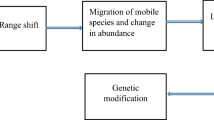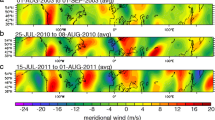Abstract
This research estimates the impact of climate on European agriculture using a continental scale Ricardian analysis. Climate, soil, geography and regional socio-economic variables are matched with farm level data from 41,030 farms across Western Europe. We demonstrate that a median quantile regression outperforms OLS given farm level data. The results suggest that European farms are slightly more sensitive to warming than American farms with impacts from \(+\)5 to \(-\)32 % by 2100 depending on the climate scenario. Farms in Southern Europe are predicted to be particularly sensitive, suffering losses of \(-\)5 to \(-\)9 % per degree Celsius.





Similar content being viewed by others
Notes
Comparing the ratio of the predicted value using OLS to the actual value in each decile, we found that the log-linear model has a more uniform predictive power compared to the linear model.
FADN is well documented on http://ec.europa.eu/agriculture/rica/index.cfm. and the information about weighting can be found on http://ec.europa.eu/agriculture/rica/methodology3_en.cfm.
The following farms are removed: 2230 duplicates, 654 farms in out or range islands (e.g. Azores, Tenerife, Madeira), 1700 farms with missing spatial information, 3203 farms under glass, 8864 farms with less than 1 hectare land in ownership, 597 farms with low total land value (\(<\)50 €), and 82 outliers (e.g. farms with zero output or with a high output with (nearly) no farmland).
The grid sizes for the three climate models are considerably larger than the NUTS3 regions. The statistical downscaling we rely on generates a smooth prediction across space. It should be understood that these local predictions are plausible but highly uncertain.
References
Bozzola M, Massetti E, Mendelsohn R, Capitanio F (2014) A Ricardian analysis of the impact of climate change on Italian agriculture. Graduate Institute, mimeo. http://www.webmeets.com/files/papers/wcere/2014/1428/WCERE_updated_Bozzola.pdf
Ciscar JC, Iglesias A, Feyen L, Szabo L, Van Regemorter D, Amelung B, Nicholls R, Watkiss P, Christensen OB, Dankers R, Garrote L, Goodess CM, Hunt A, Moreno A, Richards J, Soria A (2011) Physical and economic consequences of climate change in Europe. Proc Natl Acad Sci USA 108(7):2678–2683
Cline WR (1996) The impact of global warming of agriculture: comment. Am Econ Rev 86(5):1309–1311
Conley TG (1999) GMM estimation with cross sectional dependence. J Econom 92(1):1–45
Deschênes O, Greenstone M (2007) The economic impacts of climate change: evidence from agricultural output and random fluctuations in weather. Am Econ Rev 97(1):354–385
Diebold FX, Mariano RS (2002) Comparing predictive accuracy. J Bus Econ Stat 20(1):134–144
EC (2009) COUNCIL REGULATION (EC) No 1217/2009 of 30 November 2009 setting up a network for the collection of accountancy data on the incomes and business operation of agricultural holdings in the European Community
Elliott J, Deryng D, Müller C, Frieler K, Konzmann M, Gerten D, Glotter M, Flörke M, Wada Y, Best N, Eisner S, Fekete BM, Folberth C, Foster I, Gosling SN, Haddeland I, Khabarov N, Ludwig F, Masaki Y, Olin S, Rosenzweig C, Ruane AC, Satoh Y, Schmid E, Stacke T, Tang Q, Wisser D (2014) Constraints and potentials of future irrigation water availability on agricultural production under climate change. Proc Natl Acad Sci 111(9):3239–3244
Fezzi C, Bateman IJ (2015) The impact of climate change on agriculture: nonlinear effects and aggregation bias in Ricardian models of farmland value. J Assoc Environ Resour Econ 2:57–92
Fisher AC, Hanemann WM, Roberts MJ, Schlenker W (2012) The economic impacts of climate change: evidence from agricultural output and random fluctuations in weather: comment. Am Econ Rev 102(7):3749–3760
Gordon C, Cooper C, Senior CA, Banks H, Gregory JM, Johns TC, Mitchell JFB, Wood RA (2000) The simulation of SST, sea ice extents and ocean heat transports in a version of the Hadley Centre coupled model without flux adjustments. Clim Dyn 16(2):147–168
Kala N, Kurukulasuriya P, Mendelsohn R (2012) The impact of climate change on agro-ecological zones: evidence from Africa. Environ Dev Econ 17(06):663–687
Kelly DL, Kolstad CD, Mitchell GT (2005) Adjustment costs from environmental change. J Environ Econ Manag 50(3):468–495
Kimball Bruce A (2007) Plant growth and climate change. In: Morison JIL, Morecroft MD (eds) Biological sciences series. Q Rev Biol 82(4):436–437
Koenker R (2004) Quantile regression for longitudinal data. J Multivar Anal 91(1):74–89
Koenker R, Bassett G (1978) Regression quantiles. Econometrica 46(1):33–50
Kurukulasuriya P, Kala N, Mendelsohn R (2011) Adaptation and climate change impacts: a structural Ricardian model of irrigation and farm income in Africa. Clim Change Econ 02(02):149–174
Lang G (2007) Where are Germany’s gains from Kyoto? Estimating the effects of global warming on agriculture. Clim Change 84(3):423–439
Legutke S, Voss R (1999) The Hamburg atmosphere–ocean coupled circulation model ECHO-G. Hamburg, Germany
Lippert C, Krimly T, Aurbacher J (2009) A Ricardian analysis of the impact of climate change on agriculture in Germany. Clim Change 97(3):593–610
Maddison D (2000) A hedonic analysis of agricultural land prices in England and Wales. Eur Rev Agric Econ 27(4):519–532
Massetti E, Mendelsohn R (2011) Estimiting Ricardian models with panel data. Clim Change Econ (CCE) 02(04):301–319
Massetti E, Mendelsohn R (2011) The impact of climate change on US agriculture: a repeated cross-sectional Ricardian analysis. In: Dinar A, Mendelsohn R (eds) Handbook on climate change and agriculture. Edward Elgar, Cheltenham
Mendelsohn R, Dinar A (2003) Climate, water, and agriculture. Land Econ 79(3):328–341
Mendelsohn R, Dinar A (2009) Climate change and agriculture: an economic analysis of global impacts, adaptation and distributional effects. Edward Elgar Publishing, Cheltenham
Mendelsohn R, Nordhaus WD (1996) The impact of global warming on agriculture: reply. Am Econ Rev 86(5):1312–1315
Mendelsohn R, Nordhaus WD, Shaw D (1994) The impact of global warming on agriculture: a Ricardian analysis. Am Econ Rev 84(4):753–771
Moore FC, Lobell DB (2014) Adaptation potential of European agriculture in response to climate change. Nat Clim Change 4(7):610–614
Nakićenović Na, Alcamo J, Davis G, de Vries B, Fenhann J,Gaffin S, Gregory K, Grübler A, Jung TY, Kram T, Lebre La RovereE, Michaelis L, Mori S, Morita T, Pepper W, Pitcher H, Price L,Riahi K, Roehri A, Rogner H-H, Sankovski A, Schlesinger M, Shukla P,Smith S, Swart R, van Rooijen S, Victor N, Dadi Z (2000) Specialreport on emissions scenarios: a special report of Working GroupIII of the Intergovernmental Panel on Climate Change. Cambridge University Press, Cambridge, 599 p
Nendel C, Kersebaum KC, Mirschel W, Wenkel KO (2014) Testing farm management options as climate change adaptation strategies using the MONICA model. Eur J Agron 52, Part A(0): 47–56
New M, Lister D, Hulme M, Makin I (2002) A high-resolution data set of surface climate over global land areas. Clim Res 21(1):1–25
Ricardo D (1817) On the principles of political economy and taxation. Batoche Books, Ontaria
Schlenker W, Hanemann WM, Fisher AC (2005) Will US agriculture really benefit from global warming? Accounting for irrigation in the hedonic approach. Am Econ Rev 95(1):395–406
Schlenker W, Hanemann WM, Fisher AC (2006) The impact of global warming on US agriculture: an econometric analysis of optimal growing conditions. Rev Econ Stat 88(1):113–125
Schlenker W, Roberts MJ (2009) Nonlinear temperature effects indicate severe damages to US crop yields under climate change. In: Proceedings of the National Academy of Sciences
Seo N, Mendelsohn R (2008a) A Ricardian analysis of the impact of climate change on South American farms. Chil J Agric Res 68(1):69–79
Seo SN, Mendelsohn R (2008b) Measuring impacts and adaptations to climate change: a structural Ricardian model of African livestock management1. Agric Econ 38(2):151–165
Wang J, Mendelsohn R, Dinar A, Huang J, Rozelle S, Zhang L (2009) The impact of climate change on China’s agriculture. Agric Econ 40(3):323–337
Washington WM, Weatherly JW, Meehl GA, Semtner AJ Jr, Bettge TW, Craig AP, Strand WG Jr, Arblaster J, Wayland VB, James R, Zhang Y (2000) Parallel climate model (PCM) control and transient simulations. Clim Dyn 16(10):755–774
Acknowledgments
The authors would kindly want to express their gratitude towards DG AGRI for access to the Farm Accountancy Data Network (FADN). Steven Van Passel also thanks FWO for funding his research stay at Yale University. Steven Van Passel is also obliged to the OECD for awarding a fellowship of the co-operative research program ‘Biological Resource Management for Sustainable Agricultural Systems’. Emanuele Massetti gratefully acknowledges funding from the Marie Curie IOF Cli-EMA “Climate change impacts—Economic modelling and analysis”.
Author information
Authors and Affiliations
Corresponding author
Electronic supplementary material
Below is the link to the electronic supplementary material.
Appendices
Appendix 1: Overview of the Model Variables and Descriptive Statistics
Appendix 2: Overview of the Current Climate and Climate Scenarios
See Table 7.
Appendix 3: Additional Regression Estimates
Rights and permissions
About this article
Cite this article
Van Passel, S., Massetti, E. & Mendelsohn, R. A Ricardian Analysis of the Impact of Climate Change on European Agriculture. Environ Resource Econ 67, 725–760 (2017). https://doi.org/10.1007/s10640-016-0001-y
Accepted:
Published:
Issue Date:
DOI: https://doi.org/10.1007/s10640-016-0001-y




